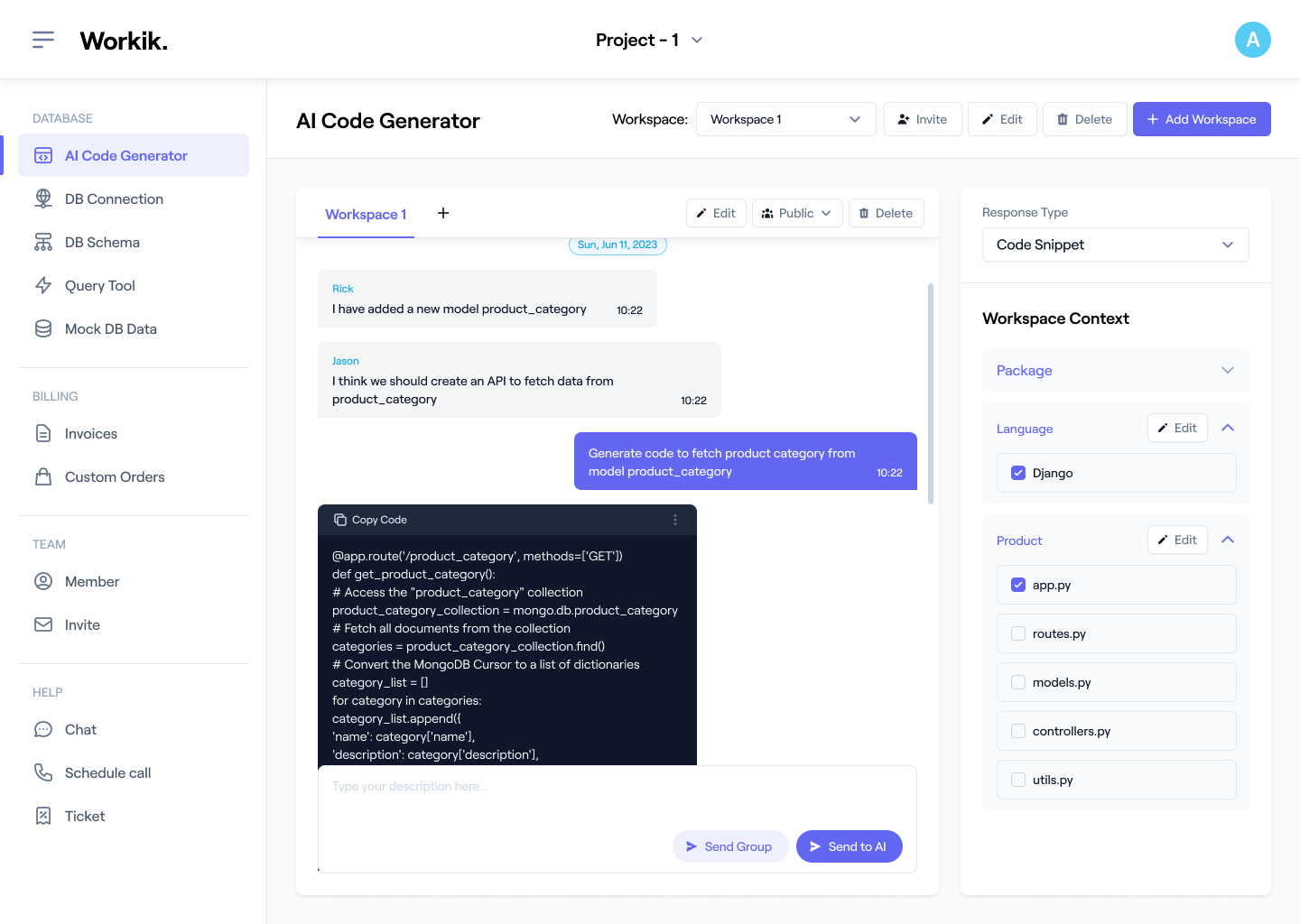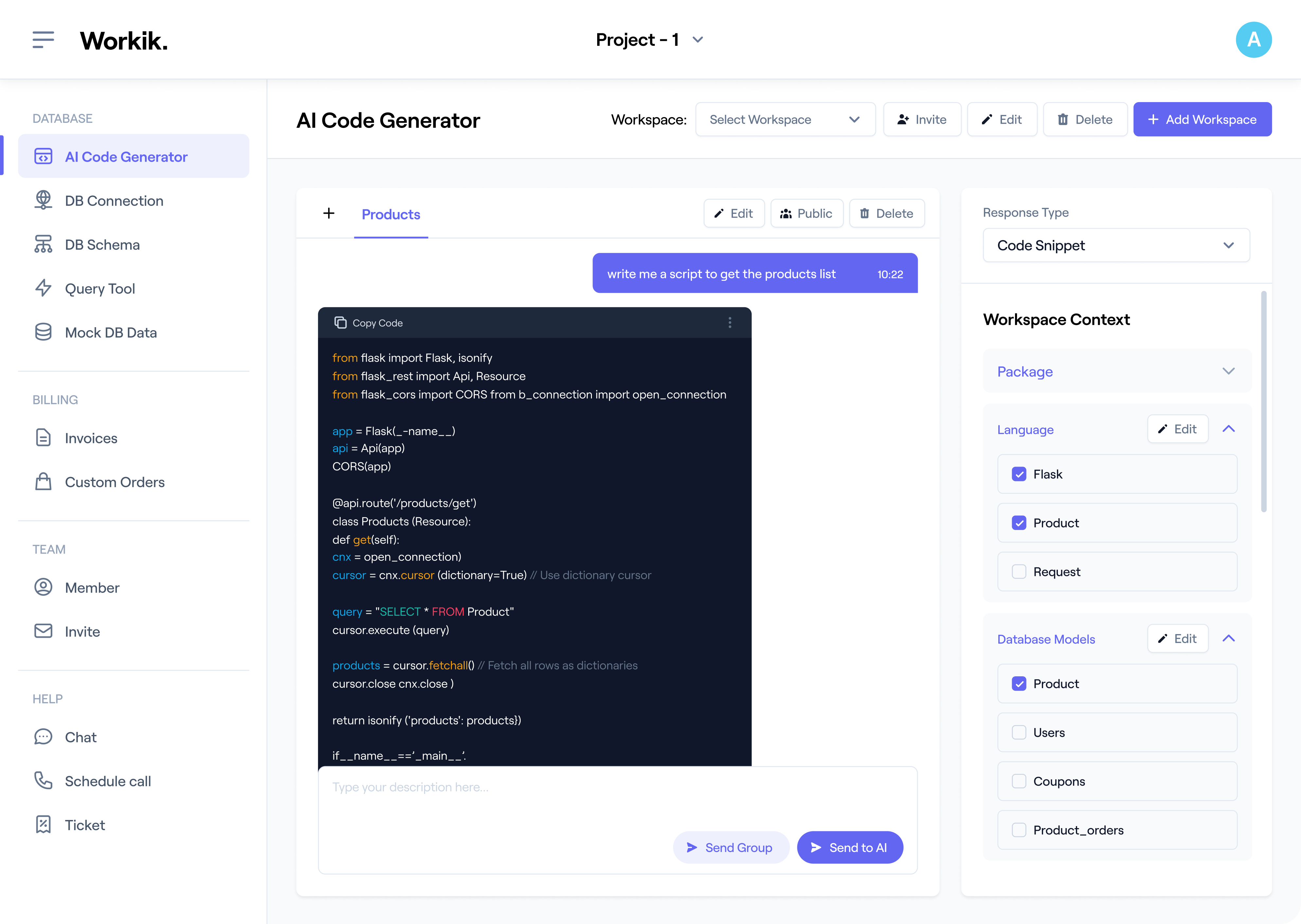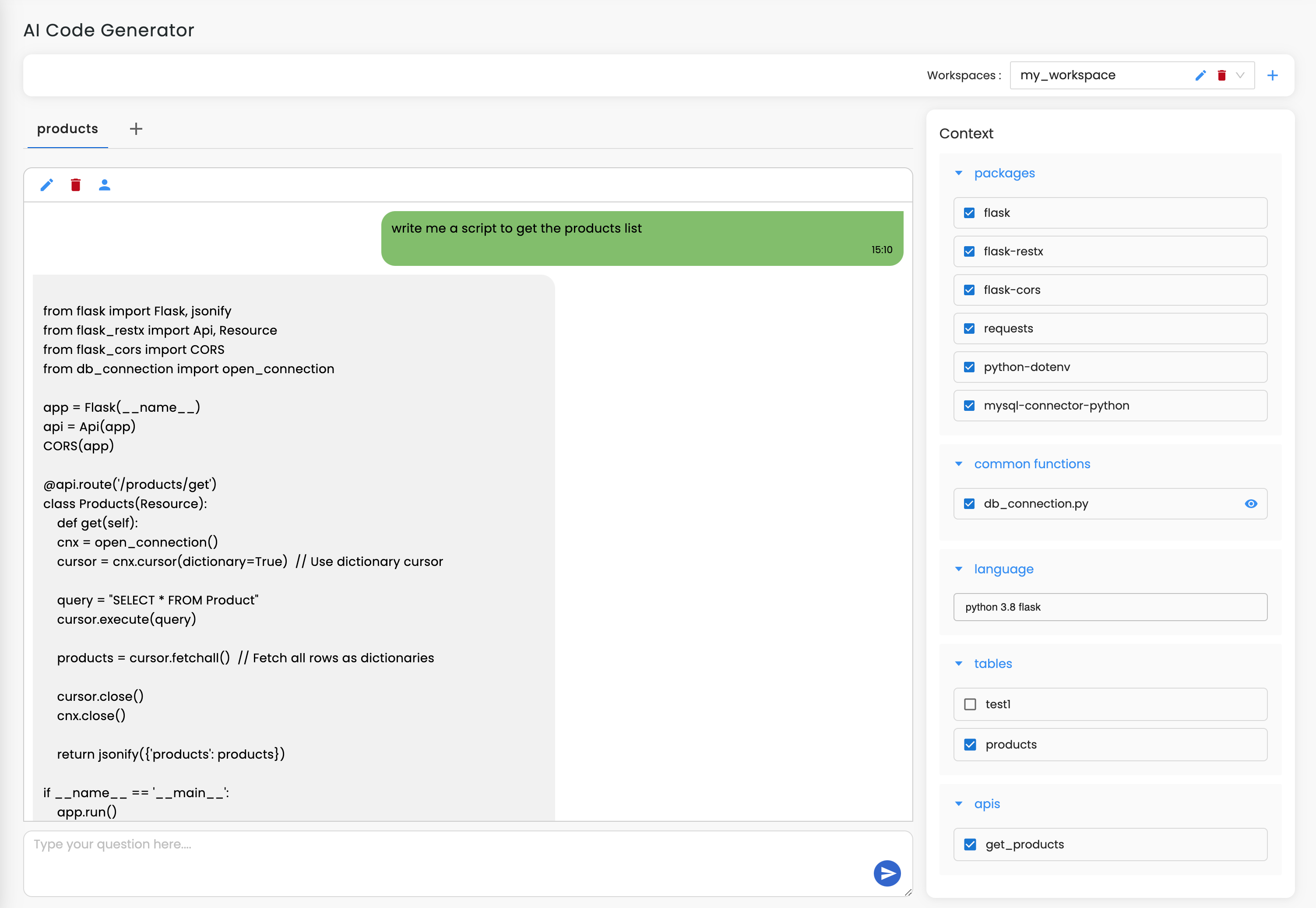
Join our community to see how developers are using Workik AI everyday.
Features

Generate Apps Instantly
AI creates apps for AWS, GCP, or Azure, integrating environment variables, APIs, and cloud configs.

Automate Cloud Pipelines
AI assists in tasks like scaling, backups, and CI/CD pipelines, supporting API triggers and conditional logic.

Document Cloud Infrastructures
AI helps to generate and update documentation, covering configurations, API links, and security protocols.

Optimize Cloud Resource Usage
AI can craft scripts to monitor and scale cloud resources with Prometheus to optimize performance and reduce costs.
How it works
Register via Google or manually and start automating cloud tasks immediately.
Connect your GitHub, GitLab, or Bitbucket repository. Define cloud platforms (AWS, GCP, Azure), set environment variables, and add API details for tailored automation.
Workik AI can generate automation pipelines for scaling, backups, and deployments. Trigger and execute workflows with AI-optimized precision.
Fine-tune pipelines with your team. Use AI insights to enhance performance, reduce costs, and ensure smooth cloud operations.


Expand
.png)
.png)
Expand


Expand


Expand


Expand


Expand


Expand


TESTIMONIALS
Real Stories, Real Results with Workik
Workik AI revolutionized my cloud management! AI-powered pipelines saved hours and optimized resources seamlessly.

Anil Gupta
Senior Cloud Architect
Workik is a game-changer! Its AI tools simplify complex cloud tasks, making automation effortless and precise.

Ravi Mehta
Junior DevOps Engineer
Workik AI transformed our cloud automation! Real-time collaboration and AI insights supercharged our deployment workflows.

Akansha Verma
Automation Engineer
What are popular use cases of Workik AI-powered cloud automation for developers?


Some popular use cases of Workik AI for developers include but are not limited to:
* Automate resource scaling and provisioning for optimized cloud management.
* Streamline deployments with AI-generated scripts, reducing manual setup.
* Schedule automated cloud backups and disaster recovery for secure data management.
* Automate workload balancing and synchronization across multi-cloud environments.
* Trigger real-time alerts for resource usage and performance.
* Simplify API-driven workflows by automating API requests, responses, and data integration tasks.
* Generate CI/CD pipelines with AI, automating build, test, and deploy workflows across environments.
What kind of contexts can I add in Workik AI for Cloud Automation?


Workik allows diverse context-setting options for cloud automation tasks, such as:
* Sync repositories from GitHub, GitLab, or Bitbucket for seamless integration.
* Define infrastructure-as-code tools like Terraform, Pulumi, or CloudFormation.
* Add containerization tools like Docker or Kubernetes for deployment automation.
* Upload cloud resource configurations like IAM roles, VPCs, or storage setups.
* Specify workflows for CI/CD pipelines, including tools like Jenkins or CircleCI.
* Include monitoring tools like Prometheus or CloudWatch for performance tracking.
* Add environments like AWS, GCP, or Azure to tailor automation to specific platforms.
How does Workik AI optimize cloud infrastructure costs?


Workik AI identifies cost-saving opportunities by automating resource scaling, shutting down idle resources, and optimizing cloud configurations. It generates scripts that dynamically adjust resources based on usage patterns, ensuring cost-efficiency in cloud operations.
Can Workik AI assist with multi-cloud management?


Yes, Workik AI simplifies multi-cloud management by automating workload distribution and synchronization across platforms like AWS, GCP, and Azure. It generates scripts to handle resource balancing, data transfers, and API integrations across different cloud environments seamlessly.
Can Workik AI automate cloud security tasks?


Workik AI helps automate security tasks by generating scripts for vulnerability scanning, encryption, access management, and monitoring security logs. It integrates with cloud providers' security tools to ensure compliance and safeguard cloud infrastructure from threats.
How does Workik AI support CI/CD pipelines in cloud automation?


Workik AI generates scripts that automate the integration and deployment processes in cloud CI/CD pipelines. It integrates with tools like Jenkins and GitLab CI to streamline the entire deployment cycle, from testing to rolling out updates across cloud environments.
How does Workik AI assist developers in optimizing cloud automation workflows?


Workik AI optimizes cloud automation by improving resource usage, generating backup scripts, and automating security tasks like encryption and access management. It integrates with tools like Prometheus and AWS CloudWatch to provide real-time feedback for continuous workflow optimization.
How does Workik support team collaboration in cloud automation projects?


Workik enables seamless team collaboration by providing shared workspaces where multiple developers can build, edit, and manage cloud automation pipelines together. Team members can review and refine scripts, assign roles with specific permissions, and integrate with GitHub, GitLab, or Bitbucket for version control.
Generate Code For Free

Cloud Automation: Question and Answer
Cloud automation involves using tools and scripts to manage, configure, and deploy cloud infrastructure without manual intervention. It automates tasks such as server provisioning, resource scaling, backups, and deployments, enabling faster and more efficient cloud operations.
Common tools for cloud automation include:
Infrastructure as Code: Terraform, AWS CloudFormation, Azure ARM Templates
Automation Platforms: Ansible, Chef, Puppet
CI/CD Pipelines: Jenkins, CircleCI, GitLab CI
Container Orchestration: Kubernetes, Docker Swarm
Monitoring and Alerts: Prometheus, Grafana, AWS CloudWatch
Scripting Languages: Python, Bash, PowerShell
Cloud automation is widely used for:
* Auto-scaling: Automatically adjusting compute resources to match application load.
* Backup and Disaster Recovery: Automating cloud backups and recovery processes.
* CI/CD Pipelines: Streamlining code deployment and testing processes across cloud environments.
* Resource Provisioning: Automating the creation and teardown of cloud infrastructure (VMs, containers, databases).
* Monitoring and Alerts: Setting up automated monitoring and alerts for infrastructure health and performance.
Professionals skilled in cloud automation have various career opportunities, including roles such as Cloud Engineer, DevOps Engineer, Site Reliability Engineer (SRE), Infrastructure Architect, Automation Engineer, and Cloud Security Specialist.
Workik AI enhances cloud automation by offering:
Instant App Generation:
Automatically generates cloud-ready applications, tailored to platforms like AWS, GCP, or Azure.
Automation Pipelines:
AI-powered pipelines automate tasks such as scaling, backups, and deployments across cloud environments.
Documentation:
Automatically generates and maintains documentation for your cloud infrastructure, including API integrations and resource configurations.
Optimization:
AI optimizes cloud workflows, recommending best practices for resource usage, scaling, and cost management.
Monitoring and Alerts:
Assists in setting up and automating monitoring tools, providing real-time feedback on system health and performance.
Integration:
Seamlessly integrates with existing cloud environments, repositories, and APIs to automate tasks and scale infrastructure.
Explore more on Workik
Get in touch
Don't miss any updates of our product.
© Workik Inc. 2026 All rights reserved.

